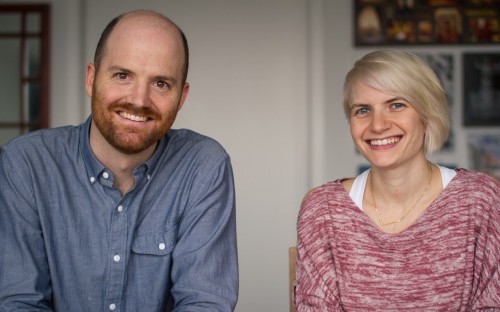This situation is indicative of a wider child care issue that is plaguing America. “Washington DC is at the heart of it,” she says, “there is a childcare crisis—there are not enough centers for the number of children being born.”
Average waiting times are well over a year, and the average monthly cost hovers around the $2,000 mark—last year there was even a campaign, led by the mayor of Washington, to fund new childcare facilities in the district because there was such a chronic shortage.
But, when Kelsey met fellow MBA student at Georgetown University’s McDonough School of Business, JP Coakley, who also had his first child during the first year of their degree, they hatched a plan to tackle the crisis.
Hatch is their startup, a coworking space with integrated licensed childcare facilities, giving parents a professional space in which they have access to their child at any time—they hope to officially launch their first building by the end of 2018.
Kelsey admits that once it’s off the ground the plan is to expand within the Washington area, and then branch out nationally.
An Entrepreneurial Education
The idea was first pitched during the Startup Factory class—one of the Intensive Learning Experiences electives within the McDonough MBA program—that encourages students to take a one-minute elevator pitch for an idea and turn it into a concrete, working business model.
At McDonough, there is a strong emphasis on encouraging students to pursue entrepreneurial ambition. Kelsey and JP were able to opt out of summer internships in their first year, and work full-time on Hatch.
Continuing to develop their company in the fall of last year, they placed fourth in a McDonough-wide business idea pitching competition called Entrepalooza, raising $1,000 as prize money.
As a nascent startup, capital reigns supreme. This year they competed in the Bark Tank Competition—another school-wide pitching competition, sponsored by the family of Ted Leonsis, majority owner, chairman, and CEO of Monumental Sports and Entertainment, and an alum of Georgetown University’s McDonough School of Business.
Ted granted the school $1 million towards the competition, to be divided over ten years. Each year, $100,000 is awarded to new businesses coming out of the school. This year, the finalists were whittled down to eight teams, and Hatch was awarded first place—Kelsey and JP were awarded $30,000 in prize money.
“To get that kind of validation, that they think this is a business that has legs, is extremely helpful when talking to potential investors,” Kelsey admits.
Tapping into McDonough's Experts
Now, working with various faculty members from the finance, real estate, and strategy departments, to iron out kinks in the company’s financial model; meander the river of issues arising from securing building leases; and develop algorithm modelling software to maximize the occupancy of the building, Kelsey and JP are tapping into McDonough’s array of business expertise.
“I can’t imagine what we’d do without access to faculty and being able to dedicate our curriculum and education to the startup. Without it, it wouldn’t be possible,” says Kelsey.
“Where else can you take something you learned in a finance classroom and start to apply it to your business [directly], work with faculty advisors to [develop] a working financial model, and turn it into real life practice. That doesn’t exist outside the walls of a school.”
Originally trained as an architect, Kelsey comes from a vastly different industry background to co-founder JP, who entered the McDonough MBA after working in nuclear energy.
Before the degree, the idea of being an entrepreneur hadn’t crossed either of their minds. And for JP, that dream almost went unrealized—his daughter was born days before they were due to take Startup Factory, and if it wasn’t for the persuasive words of class professor Eric Koester he might never have enrolled.
On top of the help from faculty members there is a team of current students working with Kelsey and JP to help get Hatch off the ground. The team of peers was recommended to them by a professor, and for the remaining six weeks of the current semester they’ll earn school credit for their work.
The Building Blocks of Innovation
Woven into Georgetown University’s McDonough School of Business DNA, entrepreneurship traverses the school’s Entrepreneurship Initiative—which comes under the banner StartupHoyas, a multitude of academic, extracurricular, and off-campus programs for budding entrepreneurs.
“There is a fleet of entrepreneurs in residence,” says JP, “people who have founded companies, and exited companies, and they provide their time pro bono for anyone who wants to pick their brains about a variety of questions.”
Weekly ‘Chalk Talks’ invite in accomplished entrepreneurs to lecture students, and there are various pitching competitions, and a Venture Capital Investment Competition, which Georgetown McDonough students have won three of the last four years.
All of this translates into an on-hand, innovative community for JP and Kelsey to tap into. “Every time we hit a speedbump they connect us with someone who can help us out,” JP explains.
“Without Georgetown not only would none of this be possible, I wouldn’t have known how much I enjoyed this process,” he adds. “I can’t help but want to get up and work on this every day. Georgetown was the catalyst for this mindset.”






